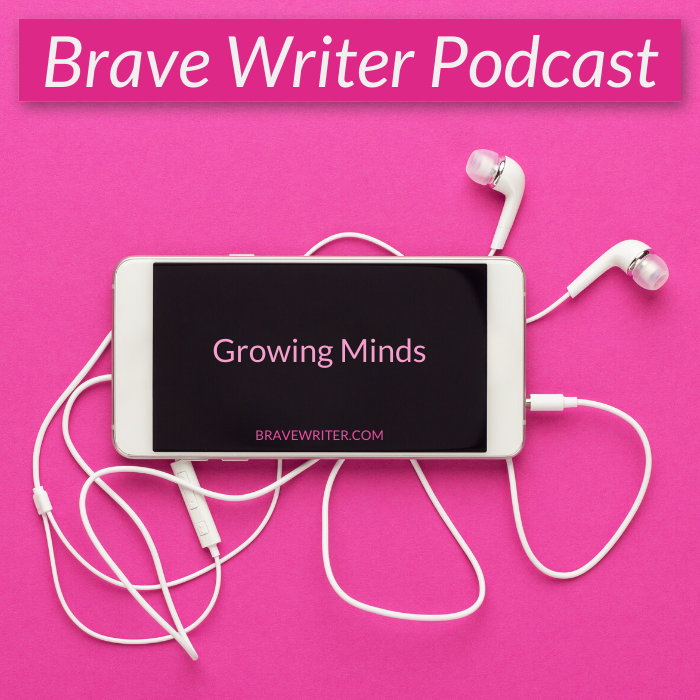Podcast: Growing Minds

Did you ever think of learning as training your brain chemistry?
The goal of skill-building in learning is automaticity, fluency, ease of use. It’s as useful to the child learning to ride a bike as it is the teen learning to think critically. Becoming automatic looks just like
- ease,
- skill, or
- fluency.
Think of what it’s like driving: You can sing along to the radio and think about the upcoming election simultaneously, all while changing lanes on a highway at 75 miles per hour. Driving is so automatic that you have the bandwidth to focus on other things—but it wasn’t like that when you were first learning, where just the radio could be a distraction. How can we facilitate this growth of a mind, skill, fluency? How can we train our children’s brain chemistry for learning?
The three primary tools that we want to teach children and then build upon as teenagers are the “3 R’s” of reading, writing, arithmetic. These are the tools that help children get at everything they will ever want to know, but we often unload them in the most uninteresting way possible—through a workbook.
For novice homeschoolers, teaching from the book seems like the easiest and most approachable way to educate. But what if you looked at the workbooks as a reinforcing tool, not the main teaching tool, and you found ways to convey the power of that subject outside of the book first? Let them have the same excitement for the subject they had when discovering the world.
Listen to the Podcast
Show Notes
What does it mean to grow a mind with regard to these 3 R’s, seeking to help our children find their way into these worlds as participants, not just as observers?
Reading
Most parents get this right: reading out loud while the child is in the womb, at bedtime, and reading together. If kids later stop enjoying reading, it could be because the family lost touch of reading as a joy. To invite a child to learn to read there has to be a gain for the child. Sometimes all it takes is an external motivation, pairing the hard work with a celebration that they put in.
Deep reading is also an essential part of the reading process. Remove distractions and read silently, but still together, for 20 minutes or more. Encourage reading on a regular basis and avoiding distractions from notifications and scrolling.
Writing
Value your children’s words by writing them down. Let them experience you valuing their words, their inner life, as writing. This signals to them that they are already writers, even if they can’t read yet. And don’t stop then. Validate your older kids that their thoughts deserve to be in writing. If they are complaining about rules, take out some paper and take notes. Signal that you take their words seriously.
If a child is charged with a writing project spend time in conversations about all the angles you could take. This set of questions can help kids get in touch with another level of thinking:
- Who’s telling the story?
- Who’s story isn’t being told?
- What’s being promoted?
- What’s being excluded?
- What assumptions did I bring with me?
- Which of my assumptions were sustained or confirmed?
- Which of my assumptions were challenged or overturned?
We cannot ask our kids to write meaningfully without stirring up the part of them that has something to say. Writing is not primarily about the formats and mechanics, that comes after you have things to say.
Arithmetic
Why does math appear to be so hard for so many people? It’s because so many people are never taught to find joy in math. There are two primary ways to teach math: the traditional way through textbooks, where you incrementally master processes that you apply to the problems in the workbook. It can include tools, and definitely relies on repeated practice and tests to confirm mastery. This process works great for some kids, but not for others.
For kids who don’t adapt to the traditional method, the secondary method of using a narrative approach to teach math may be preferred. Ask your child to narrate aloud what they are saying to themselves as they work out the process of solving a problem. Most math work is invisible. This is the way to validate that they understand the way to reach a conclusion—and if they don’t how to better explain the concept. Then ask them if the strategy they are using is useful or helpful to them. Then ask if they want to try it a different way, one that might make more sense for them. Finally, ask them “What still puzzles you?” Verify where they are getting hung up so you can gently remove the roadblocks.
When growing the mind, you can take the same caring, natural approach you took with your young children. Show interest in your kids. Notice their opinions. Be patient with their tantrums. Be their partners and their support system to help grow their minds.
Resources
- Want help getting started with Brave Writer? Head over to bravewriter.com/getting-started
- Sign up for the Brave Writer Newsletter to learn about all of the special offers we’re doing in 2020 + you’ll get a free 7-Day Writing Blitz guide just for signing up: http://go.bravewriter.com/writing-blitz
Connect
- Instagram: instagram.com/juliebravewriter
- Twitter: twitter.com/bravewriter
- Facebook: facebook.com/bravewriter


















